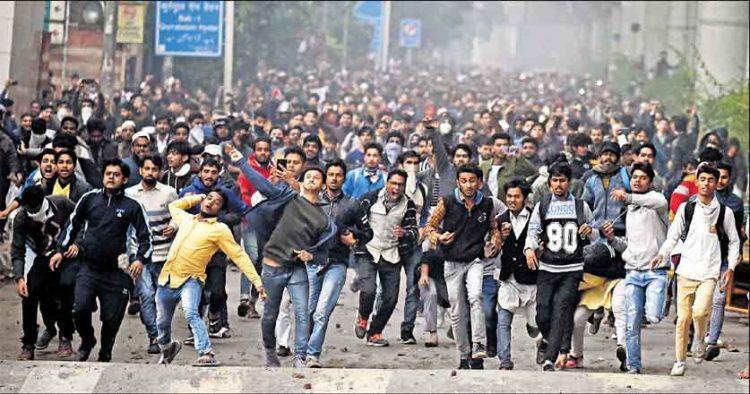Domestic Roots of Indian Foreign Policy

Representational Image. Image Courtesy: Telangana Today
India may insist that whatever it does to its own citizens is its internal affair, from turning a disputed territory into a virtual colony by making its people captives or re-defining citizenship to exclude Muslims. But in an interdependent world, which India is part of and dependent on, one cannot escape others concerns over developments inside; especially if neighbouring countries are directly impacted by them.
The manner in which the Indian government damned their state and society in order to justify a bill that is itself discriminatory against Muslims is a cause of concern for friendly neighbours. As a result, both Afghanistan and Bangladesh, two of India’s friendliest neighbours, are upset. While Bangladesh’s foreign and home minister cancelled their scheduled trip to India,the summit with Japan became a collateral casualty of protests against the amended citizenship law, as it was scheduled to be held in Guwahati. But there are other deeper issues involved as well.
On Kashmir, the Indian government faces a situation where more questions are being asked of it at world forums then ever before. So it is with the Citizenship (Amendment) Act, which, combined with an all-India NRC (NRIC), seeks to turn India’s Muslims into second-class citizens. The stark fact that all three, the moves in Kashmir, the redefined citizenship law and the NRC target Muslims gives international concerns that India is regressing more weight.
This is a healthy reminder that notwithstanding the turn towards authoritarian right wing populist regimes, left-progressive voices remain unyielding the world over and still manage to make themselves count. It is clear to the world that India stands divided and convulsed by widespread resentment at the Bharatiya Janata Party or BJP government’s ham-handed approach.
It send signals to investors at home and abroad that India is going to be preoccupied by ever-newer conflicts fostered by this government rather than focus its energy to lift the economy.
Remember, the dust is far from settled in Kashmir. By reducing Jammu and Kashmir to subject-hood, a relationship reminiscent of colonialism, India has not won too many friends, perhaps lost some. Because, imposing a fait accompli on a disputed area, where the demand for Azaadi runs deep, does not sit well with India’s image of being a plural democracy. This is hard for Indians to accept, but the hard truth is that the disputed and contested character of Jammu and Kashmir does not cease just because the government is ramming its will down a captive people.
Therefore, when Union Home Minister Amit Shah boasted that there is complete normalcy in Kashmir, the message goes out that this government considers keeping its own people captive kosher, the natural order of things, as it was for the Nazis so far as the Jews, Gypsies and left-progressive forces were concerned.
Coincidentally, while Shah was declaring “normalcy “ in Kashmir, an internal assessment of the Central Reserve Police Force (CRPF) has found that the prolonged lock-down will give “troublemakers” a chance to “start a new wave of protests and armed struggle”. The assessment also expresses serious concerns that a large number of troops staying in the Valley for a prolonged period will make them “complacent”. It also says that militants are prolonging the lock-down and depriving valley of economic activity, causing mass discontent, which is forcing the international community to pressurise India.
Read between the lines of this news report: Evidently, the security forces are expressing their concerns about the ground reality in Kashmir, and their view is remarkably different from the one their boss, the Home Minister, has been talking about. Also note the warning hidden in the assessment that you cannot keep a people captive and expect peace to reign. Besides, the security-force personnel are getting affected by this prolonged deployment too, and are having to live in temporary camps during a bitterly cold winter.
Think about it. What is “normal” about having several lakh armed soldiers wielding the power of life and death over an unarmed people whose lives are regulated by restrictions, who have no means to vent their anger and pain, in a region where national security has trumped Habeas Corpus. To characterise these as normalcy is a sick joke.
It is not as though the world is unaware of this. Little wonder that for the first time in twenty years the United States Congress will consider a bipartisan political resolution demanding restoration of civil liberties in Kashmir, including the right to peacefully protest and the release of political leaders and activists.
India’s calculated gamble of bypassing the SAARC in order to “teach Pakistan a lesson”, which has allowed the grouping to become redundant, has also meant that it is now fighting a rearguard’s battle to retain influence in its own neighbourhood, while China’s Belt and Road Initiative is making inroads. The Indian government’s loathsome rhetoric against Afghanistan and Bangladesh, two of India’s friendliest neighbours, along with targeting of our ruler’s pet hate, Pakistan, and then passing a new citizenship law, has worsened matters.
If ever it could be said that India appears isolated in the Asia-Pacific, that time is now. A valid observation has been made in a recent article published in the Business Standard newspaper, Look West can’t replace Act East. India is not part of RCEP or the Regional Comprehensive Economic Partnership. Nor is it part of APEC, or Asia-Pacific Economic Cooperation. The Indo-ASEAN Free Trade Agreement is also not fully functional, and bilateral FTAs with Japan, South Korea and even Singapore are in various nonfunctional stages. As a result, right now, India appears relatively isolated in the Asia-Pacific.
To foreign financial institutions and the Indian corporate sector, what rating agencies say matters. Well, in November Moody’s Investor Services downgraded India from “stable” to “negative”. And on 12 December S&P Global Ratings warned India of a downgrade below BBB and “stable” to “negative” outlook if economic growth does not recover. Look closely and it is clear that India’s clout, for all the boast about military prowess and economic aid, is rather modest.
Closer home, India went to Afghanistan piggybacking US-led NATO forces, believing they will remain committed for decades. But the US pulled back, leaving India little wiggle room. Ironically, India refused to talk to the Taliban and remain stuck to the Afghan regime, claiming that unlike the Taliban, they were secular and democratic. Ironically, in the past six years, the BJP-led government has downgraded secularism and democracy at home.
Nonetheless, at a moment when the Afghan peace process is at a delicate stage, antagonising the Afghan regime and people, or worse being dismissive of their concerns, just because all this government cares about is mobilising Hindus, then we will have to pay a price. Remember, there are no permanent friends and permanent enemies. Turning enemies into friends and friends into allies is what makes for successful foreign policy. Antagonising a friendly country and its people, intended or otherwise, speaks of a myopic foreign policy.
So yes, there are domestic roots to foreign policy, more so when a country changes for the worse. This also means, paradoxically, that external world pressures would be felt relatively more intensely by us in India, thanks to our degree of dependence on it and the BJP government’s propensity for divisive politics at home, which engenders conflicts that spill over our borders and distracts the country from attending to the more urgent task of improving life and liberty at home.
The views are personal.
Get the latest reports & analysis with people's perspective on Protests, movements & deep analytical videos, discussions of the current affairs in your Telegram app. Subscribe to NewsClick's Telegram channel & get Real-Time updates on stories, as they get published on our website.
























